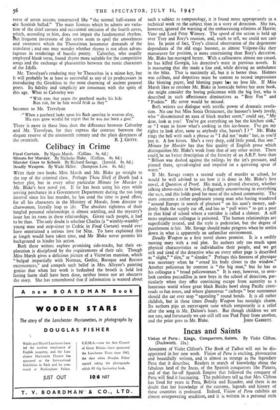Celibacy in Crime
WITH their two books Miss Marsh and Mr. Blake go straight to the top of the criminal class. Perhaps Thou Shell of Death had a better plot, but in every other particular Minute for Murder is Mr. Blake's best novel yet. If he has been using his eyes while serving perchance in a Government Department during the too long interval since his last murder, he has used the time to good effect, for all his characters in the Ministry of Morale, from director to charwoman, literally leap to life. The absolute rightness of their tangled personal relationships is almost startling, and the mystery's issue has its roots in these relationships. Given such people, it had to be thus. The only doubt is whether Charles (a " wimbly-wambly " young man and step-sister to Cedric in Final Curtain) would eve: have entertained a serious love for Nita. To have explained this at length would have taken time, and Mr Blake never permits his background to hinder his action.
Both these writers explore promising side-tracks, but their ex- ploration is disciplined by the requirements of their tale. Though Miss Marsh gives a delicious picture of a Victorian mansion, which " bulged impartially with Norman, Gothic, Baroque and Rococo excrescences," and compels such belief in Mrs. Alleyne's painting genius that when her work is bedaubed the breath is held lest lasting harm shall have been done, neither house nor art obscures the story. She has remembered that if information is wanted about
such a subject as campanology, it is found more appropriately in a technical work on the subject than in a story of detection. She has, however, ignored the warning of the embarrassing relations of Harriet Vane and Lord Peter Wimsey. The speed of the action is held up over Troy and Rory's reunion, and, truth to tell, we could not care less. In point of fact, Troy's clinical observation of the degenerate dependants of the old stage baronet, as almost Volpone-like they manoeuvre for position, is more entertaining than Rory's detection. Mr. Blake has managed better. With a callousness almost too casual, he has killed Georgia, his detective's mate in previous novels. It is reassuring that she made a fine end, while driving an ambulance in the blitz. That is succinctly all, but it is better thus. Holmes was celibate, and detectives must be content to record impressions like blotting paper, and blotting paper has no love life. If Miss Marsh likes to emulate Mr. Blake in homicide before her next book, she might consider the boring policeman with the big feet, who is described in such affectionate diminutives as "Brer Fox" and "Foxkin." He never would be missed.
Both writers use dialogue with terrific power of dramatic revela- tion. No one but Miss Sonia Orrincourt, the baronet's lowly lovely, who " disseminated an aura of black market scent," could say, " My dear, look at you! You've got everything on but the kitchen sink," or " I want to know what's cooking in this ice-house. I've got my rights to look after, same as anybody else, haven't I ? " Mr. Blake rings the bell with such a phrase as "I did not ' make ' her, as you'd put it. A few kisses. She's a very deep, cold little pond, that one." Minute for Murder has that fine quality of English prose which distinguishes Mr. Blake's work from that of any other writer. There could. be no better description of the ferocity of an A.R.P. hose than " Billson was dashed against the railings by the jet's pressure, and pinned there, spread-eagled and impaled on a quivering spear of water."
If Mr. Savage essays a second study of murder at school, he would be well advised to see how it is done in Mr. Blake's first novel, A Question of Proof. His maid, a pivotal character, whether talking above-stairs or below, is flagrantly unconvincing in everything she says, and this holds good for most of the school community. The story concerns a rather unpleasant young man who having wandered " around Europe in search of pleasure " on his aunt's money, sud- denly finds the supply cut off, and has to " pull wires " to get a post in that kind of school where a corridor is called a cloister. A still more unpleasant colleague is poisoned. The human relationships are superficially treated, and the style is pedestrian, but the degree of puzzlement is fair. Mr. Savage should make progress when he settles down in what is apparently an unfamiliar environment.
Deadly Weapon as a first novel shows promise. It is a swiftly moving story with a real plot. Its authors rely too much upon physical characteristics to individualise their people, and we get sick and tired of the detective who on every other page is described as " slight," " slim," or " slender." Perhaps this fineness of physique was necessary when he oozed his body closer to the window." Another policeman by contrast is "the big man," but he has as his colleague a " broad policewoman." It is easy, however, to over- look careless peccadillos in new boys in the school of detection, par- ticularly when they offer convincing escape from austerity to a luxurious world where great black Buicks bowl along Pacific coast- roads to fun zones, and where glamorous " carhops " bear sustenance should the car ever stop " squealing " round bends. It is all rather childish, but in these times Deadly Weapon has nostalgic charm. Its authors pipe an extravagant tune which temporarily is a relief after the song in Mr. Dalton's heart. But though children we are not rats, and fortunately we can still tell one Pied Piper from another,


































 Previous page
Previous page